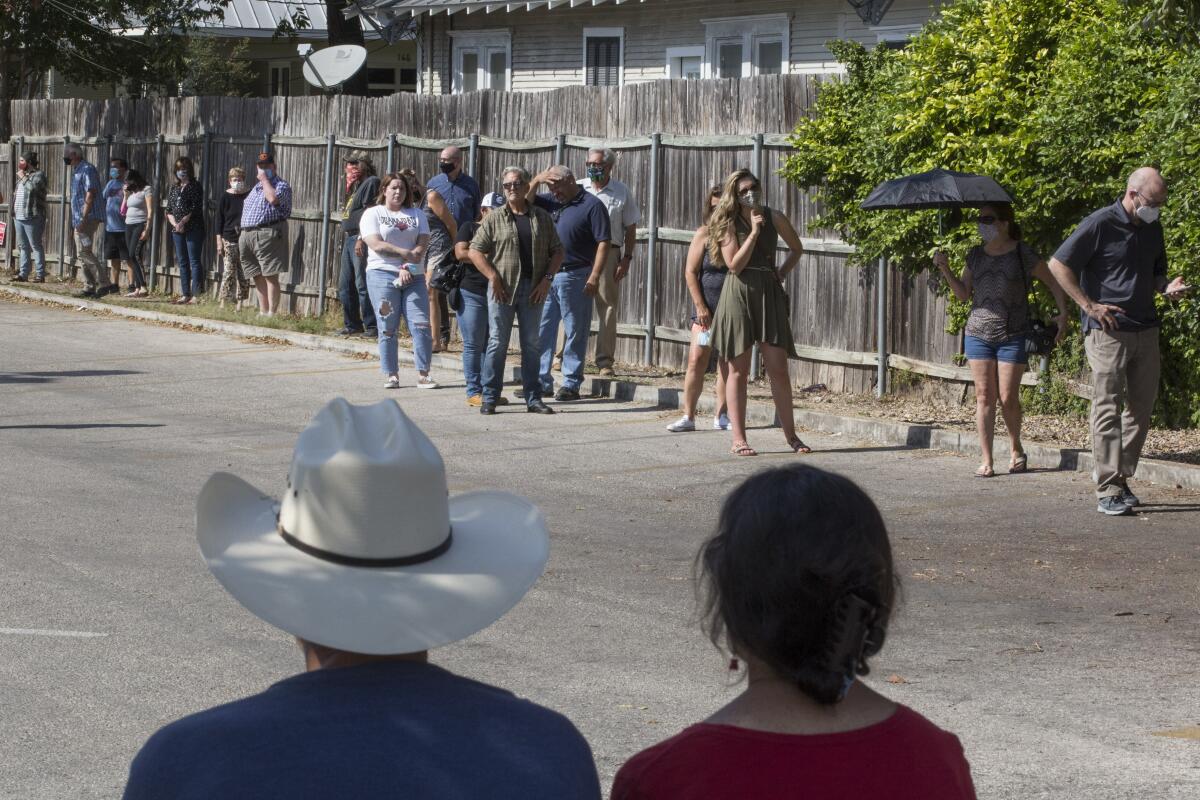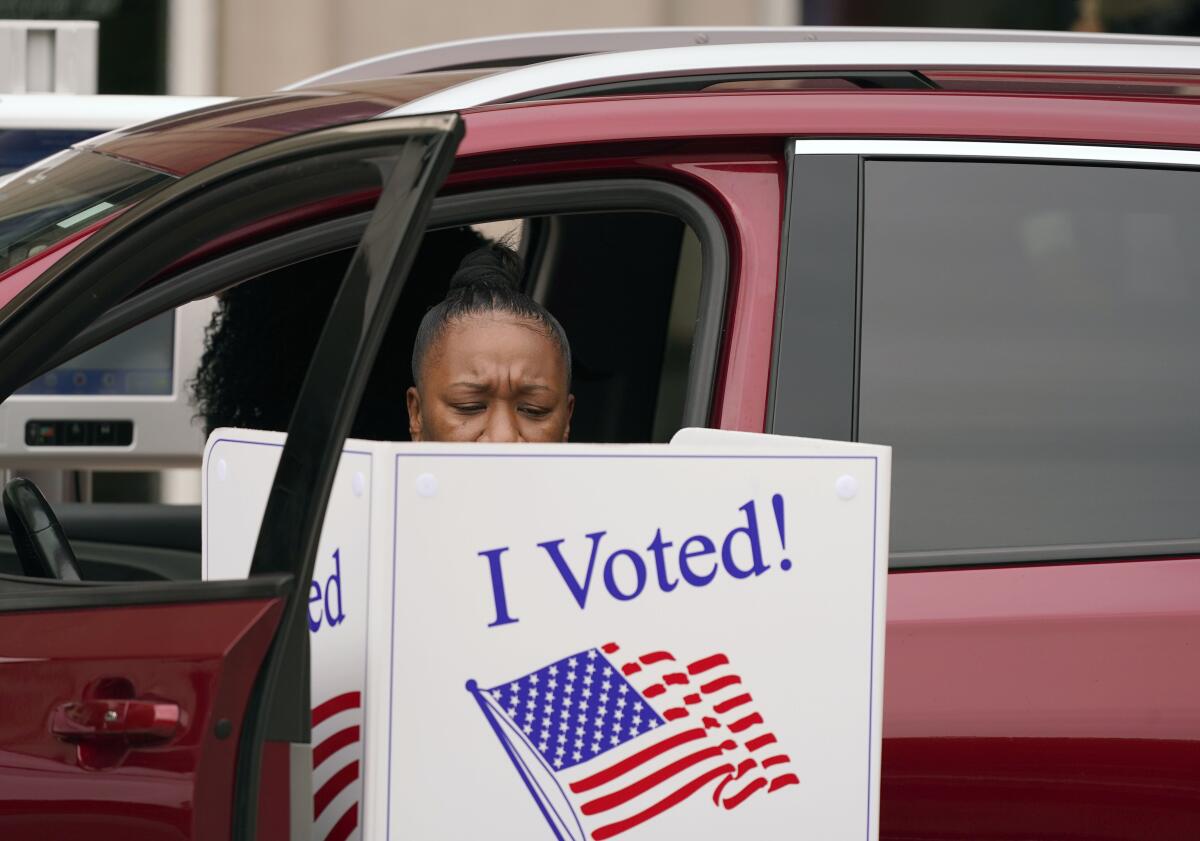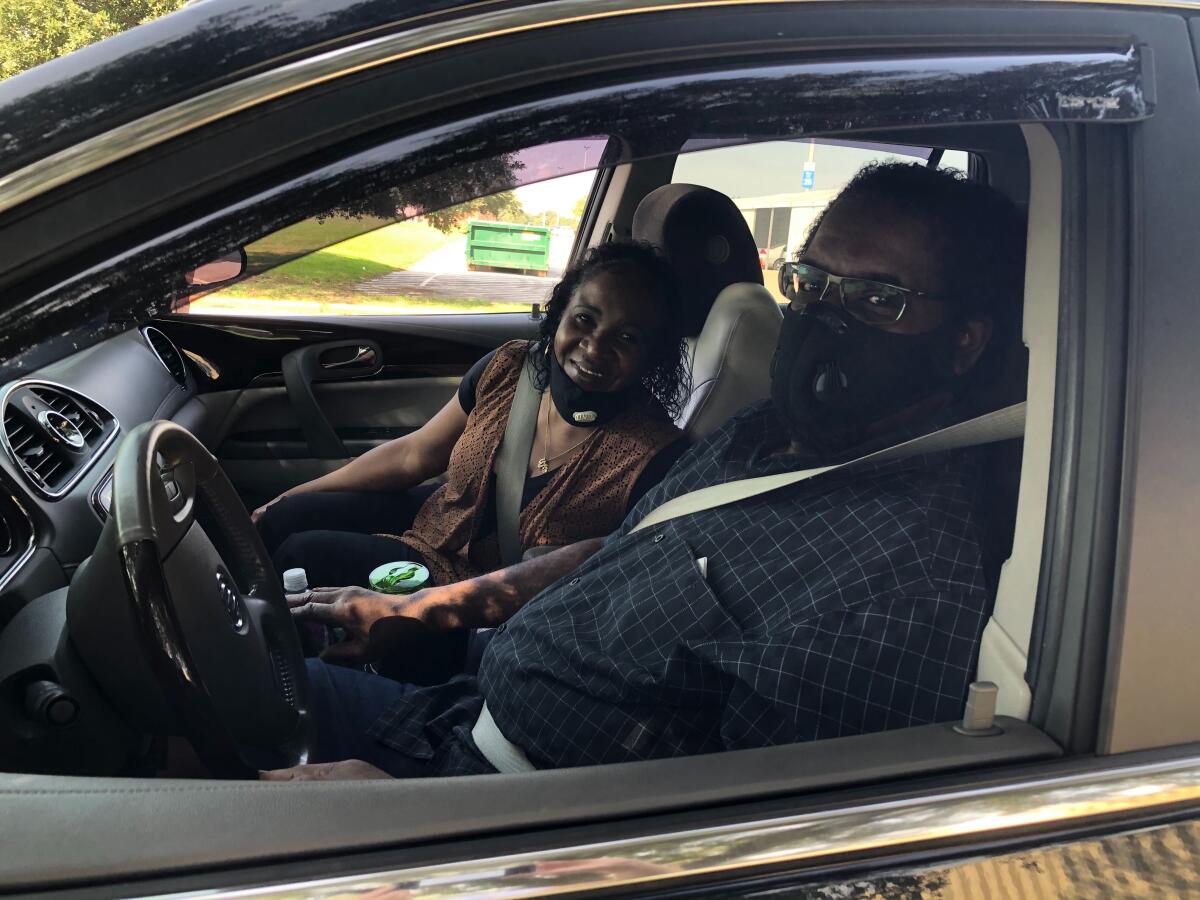Texas legal battles over voting could have an impact on election

- Share via
HOUSTON — When retired elementary school teacher Marilyn Wolfe and her husband tried to drop off their completed ballots at a county office outside Houston on Oct. 9, they were turned away.
Wolfe, 82, said a clerk explained to them and several other couples trying to deliver ballots they had requested and received by mail that the completed ballots could not be accepted at the site — one of a dozen in the county — because of an order from Republican Gov. Greg Abbott. The governor’s last-minute proclamation had limited each of the state’s 254 counties, including Houston’s Democrat-led Harris County, the nation’s third largest by population, to a single ballot drop site.
A federal judge overruled Abbott that day, but by the next day the state had successfully appealed to the U.S. 5th Circuit Court of Appeals.
“We were just totally flabbergasted,” Wolfe said.
Texans are supposed to be able to vote several ways. Early in-person voting started last week. Those who are out of state are eligible to vote absentee. Certain in-state voters can have ballots mailed to them, including those who are disabled and 65 or older. Those ballots may be mailed back to election officials or dropped with poll workers at designated sites, as the Wolfes were attempting to do.

But ongoing legal maneuvers by Republican state officials have resulted in frustration at the polls amid record early turnout. Abbott and others say they’re trying to guard against possible voter fraud, but voting rights groups and Democrats complain of voter suppression — long a problem for minorities in Texas — and they worry the actions could tilt the outcome of the presidential election.
Texas was one of nine mostly Southern states barred for decades from changing voting laws without federal approval under the Voting Rights Act of 1965. Since the U.S. Supreme Court struck down provisions of the act in 2013, Texas Republicans have attempted to redistrict and to impose stricter voter identification legislation, prompting lawsuits alleging voter suppression.
Abbott has also refused to mandate masks at the polls during the COVID-19 pandemic, potentially further tamping down the vote. And Republican leaders have fought straight ticket voting, which would have reduced the time voters spend casting in-person ballots, and have unsuccessfully tried to block curbside voting and online voter registration. Republicans have also fought one another over voting restrictions: When Abbott ordered early voting to start a week earlier than scheduled because of the pandemic, other state GOP leaders unsuccessfully sued to stop him.
When Harris County, the largest in the state by population with nearly 2.5 million registered voters, tried to mail ballots to 1.9 million people eligible to vote by mail who had not requested mail-in ballots, the state appealed and the Texas Supreme Court ruled against the county. Harris County also offered curbside voting at 10 sites for the first time, which Texas GOP groups sued to block, appealing last week to the state Supreme Court.
The latest statewide ballot fight started this month when Abbott ordered counties to limit themselves to a single site where voters can drop ballots that have been mailed to them, arguing it would prevent voter fraud.
The governor claimed the restrictions “will help stop attempts at illegal voting.” His order was in line with efforts by President Trump and Republican officials across the country to cast doubt on the security of mailed ballots.
Although there have been cases of voter fraud in Texas, including ones involving recent arrests, they have been rare, small-scale efforts to influence local elections. Opponents of the governor’s order argue that it was designed to frustrate voters in and around the state’s largest cities, which in recent years have become Democratic strongholds, chiefly Harris County, larger in area than Rhode Island and with nearly five times the population, 4.7 million people.
“To propose only a single, secure drop-off location for a county of our size during a pandemic is ludicrous,” Lina Hidalgo, the county judge — a Texas term for the chief executive — said in a statement. “… Abbott’s move is transparently about suppression, not security. It is also part of a broader effort by the Trump administration to confuse voters, discourage voter participation and degrade public confidence in our elections.”
On Oct. 9, U.S. District Judge Robert Pitman — an Obama-era nominee based in Austin — overturned Abbott’s order, writing that, “By limiting ballot return centers to one per county, older and disabled voters living in Texas’s largest and most populous counties must travel further distances to more crowded ballot return centers where they would be at an increased risk of being infected by the coronavirus in order to exercise their right to vote.”
The next day, Texas Atty. Gen. Ken Paxton filed a request in federal appeals court to stay the judge’s order, arguing that it “undermines our election security, disrupts the democratic process, and will only lead to voter confusion.”
A three-judge panel of the 5th Circuit Court, all Trump appointees, granted Paxton’s request days later. While the groups that sued may request a hearing before the entire 5th Circuit Court or appeal to the U.S. Supreme Court, they don’t expect relief before Nov. 3. A Texas state judge ruled in their favor last week, but the federal appeals court’s decision is still binding.
“The law is gone. It’s party politics and power,” said Luis Vera Jr., an attorney for one of the groups that sued, the League of United Latin American Citizens, noting Texas’ Republican leaders “know they can drag this out.”
Marilyn Wolfe, the retired teacher, called the voting restriction “disgraceful,” and said she worried it would stop people from casting ballots.
“I don’t know why anybody wouldn’t see right through that,” said Wolfe, a Democrat.
After she and her husband were turned away from a county office when they sought to drop off the mail ballots they had requested, they decided not to drive to the county’s central drop site in Houston, she said, because they were afraid of traffic, lines and crowds.
Her husband, Richard Wolfe, 83, has underlying health conditions that put him at higher risk of serious illness or death if he contracts the coronavirus. So the couple decided last week to mail their ballots instead from a local post office.
Texas is one of a handful of states that begin processing ballots returned by mail — both those mailed back and dropped off — before election day, but they’re not officially counted until then. Harris County began processing them Wednesday, and by Thursday had received more than 50,000 of the ballots. In 2016, the county received 101,000 mailed ballots.
Early voting in Texas started Tuesday, with record turnout in Harris County: 128,186, easily breaking the record 68,000 early votes cast in 2016. In contrast, the entire state of Georgia reported a total of 128,590 votes cast on the first day of early voting.
As of Saturday, 518,708 in-person early votes and 67,255 ballots by mail had been cast in Harris County. Statewide, nearly 3.9 million people had voted early by Saturday, about 3.3 million in person and 558,019 by mail.
Some at the polls last week said they worried about vote fraud and agreed with the governor that ballot drop sites should be restricted.
“It’s good because you can get oversight. It’s all about control,” said retired Texas Ranger Dewayne Goll, 58, after casting an early vote for Trump at a polling place in a German dance hall-turned community center in a Houston suburb.
“They’re just trying to make it confusing,” said Don Schmidt, 57, a conservative pipeline engineer in cowboy boots, Wrangler jeans and a Harley-Davidson belt buckle, after voting for Trump.
On Wednesday, Bruce and Sue Jocz, 66-year-old Republican retirees, said they had trouble casting ballots that had been mailed to them at the single county drop-off site outside a Houston stadium.
Lighted signs and staffers initially directed them to the wrong entrance, they said. Once inside, the stadium parking lots were a maze of orange plastic cones. At first, they went to an area that turned out to be for curbside voting. Later, they found a tent set up with staff members to receive their completed ballots. Other voters driving near them stopped to ask police stationed at the polling place where to vote and whether they needed stamps on ballots mailed to them that they were dropping off.
“They couldn’t have made it more confusing,” Sue Jocz said as she sat with her husband in their pickup truck after voting.
Both said they voted for Trump in 2016 but were switching to Biden this time, disillusioned with the president whom Sue Jocz called “dishonest and self-promoting.” Neither worried about the possibility of rampant vote fraud Trump often tweets about.
Bruce Jocz, a retired lawyer, was more troubled by the governor limiting ballot drop sites.
“There needs to be more spots to give people more chance to vote,” he said. “For a small county that would make sense but for Harris County, this is ridiculous.”
His wife agreed.
“They’re just making it difficult on purpose,” she said.

Henry Bell, 73, a retired, disabled food service manager and his wife, Martha Bell, 70, a retired paralegal, also drove from the outer reaches of the county to Houston on Wednesday to drop off ballots they had requested by mail. The couple, who are Black, conservative Democrats, voted for Biden and said restricting voters to one ballot drop-off site amounted to voter suppression, in particular for those without transportation.
“Houston is huge and we have the same drop box as some little old place?” he said. “It’s designed to discourage people from voting.”
More to Read
Sign up for Essential California
The most important California stories and recommendations in your inbox every morning.
You may occasionally receive promotional content from the Los Angeles Times.











